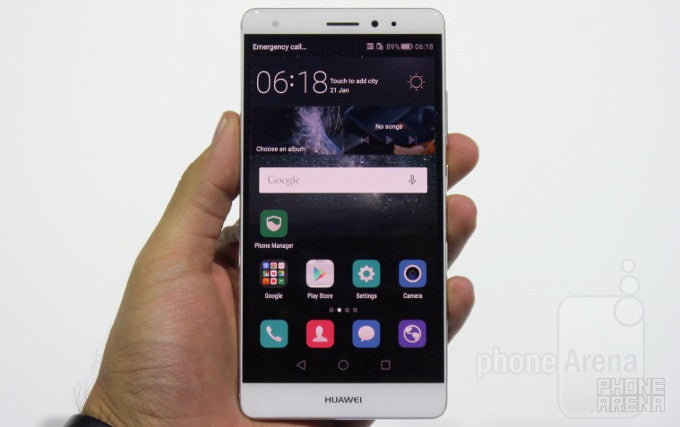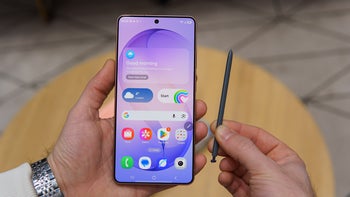Huawei Mate S hands-on

Huawei unveiled today what could be the toughest Android competitor to the upcoming iPhone 6s Plus — the 5.5" Mate S which has a version equipped with a Force Touch display. The pressure-sensitive screen means that the panel distinguishes between a light tap or a harder press, and reacts accordingly, and we are taking one for a spin at the IFA expo for your viewing pleasure.
Design
As can easily be guessed from its 5.90 x 2.96 x 0.28 inches (149.8 x 75.3 x 7.2 mm) dimensions, the Mate S sports a very good 74% screen-to-body ratio on paper. It's a tad wider than the best 5.5-incher achievements out there, yet doesn't feel this way in the hand, as it is very thin, and especially so towards the minimalist, tapered edges, making it very ergonomic to hold. The cold metal feeling in your palm is cool, too (pun intended), though the aluminum doesn't mean that the phone feels slippery to the touch.
Display
The 1080p Super AMOLED screen panel is tapering to the sides in a typical 2.5D fashion, and is every bit as vibrant and a tad oversaturated as you can expect from a screen with this technology. The viewing angles are extremely wide, and the blacks are deep and real. The screen is also protected by Corning's latest and greatest — Gorilla Glass 4 — so the Mate S enters the still rather elite club of devices offering this newer generation of scratch-protected glass.
Processor and memory
The phablet is powered by Huawei's newest HiSilicon Kirin 935 chipset, which is an octa-core, 2.2 GHz endeavor, with ARM Cortex-A53 cores and 64-bit processing. Huawei has coupled its home-grown silicon with 3 GB of RAM, and given the light Emotion UI 3.1 that is running on the phablet, the whole shebang moves in a smooth and oily manner. While we obviously didn't spend enough quality time with the Mate S to be sure beyond a shadow of doubt, it's looking like the company's new phablet will deliver on the performance front no problem.
Camera
With the Mate S we get the same setup that is on the flagship Huawei P8 — a 13 MP camera in the back with an RGBW sensor, optical image stabilization and dual flash, as well as an 8 MP selfie shooter with the rare front LED flash. The camera has a full manual mode with ISO adjustments, exposure compensation, exposure time, white balance and focusing, as well as things like grid adjustments, and flash-assisted focusing. We found the camera app to be full to the brim with features that are surprisingly easy to find, yet the graphics could be a tad larger for our grubby mitts to press without fumbling around.
Expectations
All in all, everything about the Mate S feels and touches great, down to the smallest details like directional mics, or dual speakers at the bottom, except for the pricing scheme, which is a bit on the hefty side, unlike the handset.
The 32GB version in titanium grey or mystique champagne will run at 649 euros, while the version with 64GB of ROM will come in "prestige" gold or coral pink, with a 699 euros tag. The 128GB Force Touch version will likely go north of that with at least a hundred, so it might have a steep hill to climb against a similarly priced iPhone 6s Plus, which might very well turn out to be its main and only competitor, because of the pressure-sensitive display. Unfortunately, as to when the Mate S will make its presence known on the market, we just don't know for now.

Follow us on Google News














Things that are NOT allowed:
To help keep our community safe and free from spam, we apply temporary limits to newly created accounts: